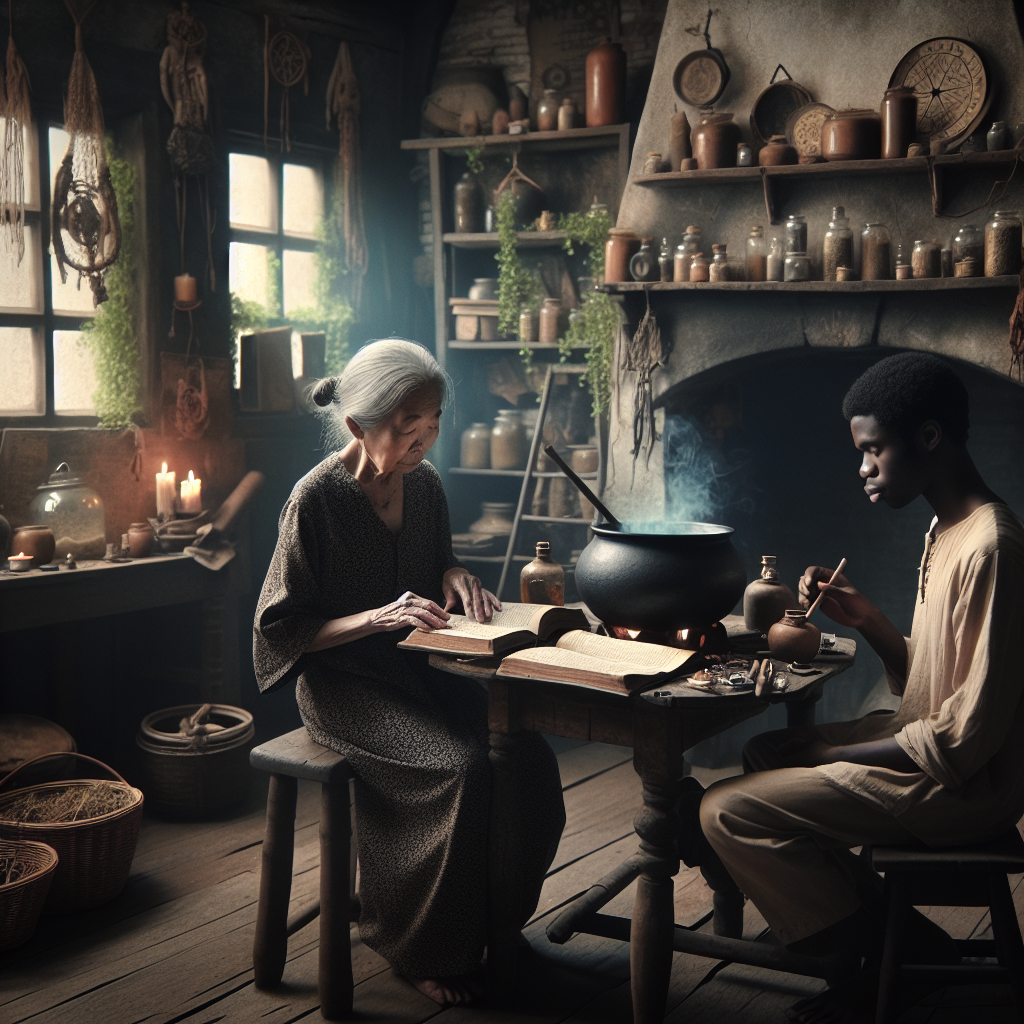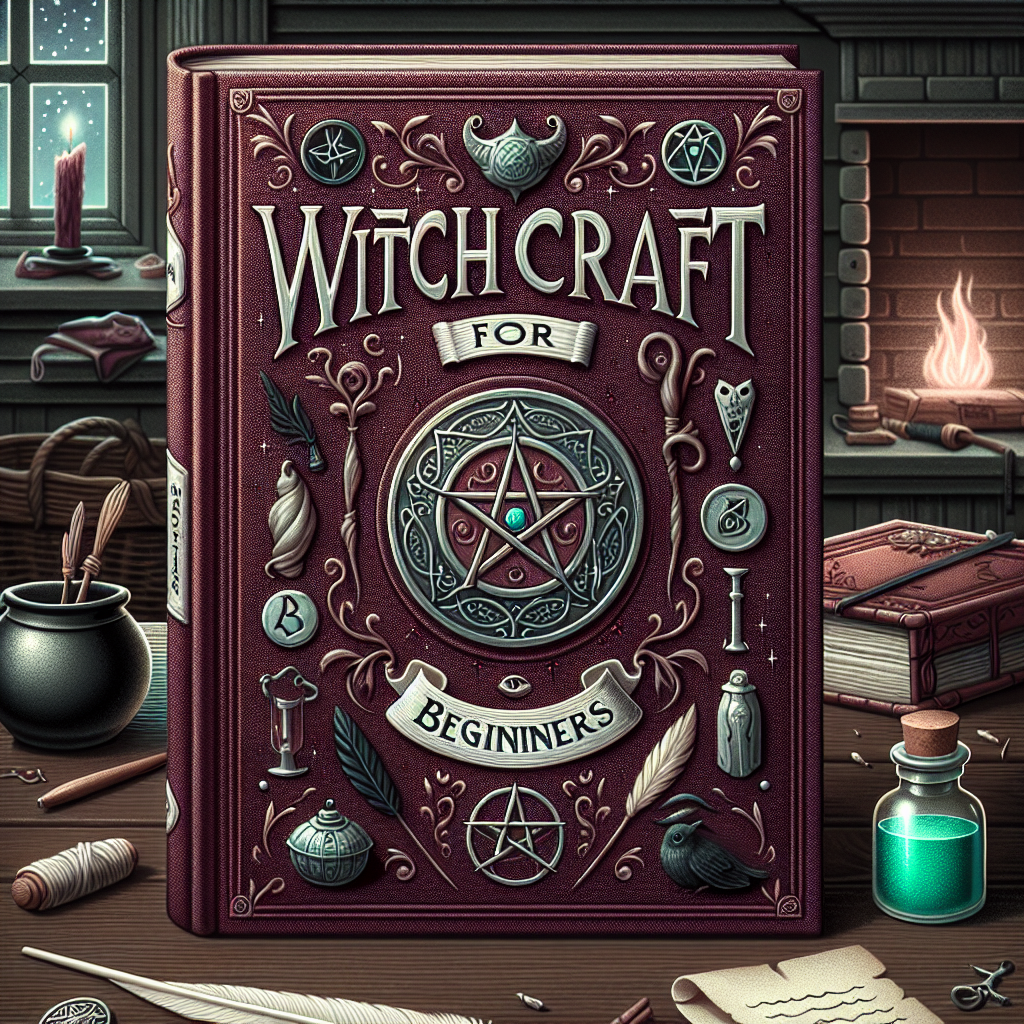As an Amazon Associate I earn from qualifying purchases.

Witchcraft, an ancient practice that intertwines the spiritual realm with the living world, might be more mainstream than you think; currently, it accounts for almost 1.5 million people who classify themselves as Wiccans or witches in the U.S. alone. This spectacular rise in recent years signifies a revival of the ancient pagan traditions in the 21st century. Witchcraft for beginners: starting your magical journey involves understanding and reconnecting with the natural world, and developing a deep sense of reverence for all life forms.
Historically, witchcraft can be traced as far back as the prehistoric days, where our ancestors would use rituals to harness the energies around them. It took different forms throughout human history, reflecting local beliefs, traditions, and cultures. Today, the practice consists mainly of neo-pagan traditions, with Wicca being one of the main subsets. Witchcraft is an earth-centered practice that worships both a goddess and a god, as well as the divine in all living things. It also involves casting spells, which is viewed as a way to harness and manipulate energy to achieve desired outcomes.
Starting your magical journey requires openness, understanding, and sensitivity towards the energies around you. Begin by establishing your personal connection with nature. This can be achieved through meditation or simply spending time outdoors, observing and appreciating the natural world around you. The practice of witchcraft encourages individuals to live in harmony with the Earth, hence, developing a deep bond with the environment can pave the way for a successful magical journey.
The magical journey through witchcraft doesn’t necessarily need to involve the casting of complex spells or conducting elaborate rituals. In fact, 85% of practicing witches state that the simple acts of mindful living, such as using natural remedies, appreciating the beauty of the seasons, and practicing gratitude, form the core of their daily witchcraft practices. These acts can deepen your connection with nature and help you draw in its energies.
Witchcraft also empowers individuals to take control of their lives. With an emphasis on ‘self-care,’ practicing witchcraft can be a great ally in managing today’s fast-paced and stressful lifestyle. Spells and rituals, in essence, are about focusing intent and will, which can create a more mindful way of living.
As you advance in your spiritual journey, you might feel the need to join a group or a coven. However, according to a survey conducted by American Religious Identification, nearly 70% of practitioners identify as solitary witches, practicing their craft alone. This emphasizes that the journey into witchcraft is a personal one. As a beginner, it is essential to build your own relationship with the practice, understanding its principles and philosophies at your own pace before considering joining a group or a coven.
The final step in beginning your journey in witchcraft is often considered the initiation phase, where an individual decides to commit to a path or tradition. While some traditions require a formal ceremony to signify this commitment, others view this as a personal decision that does not require any external validation. It is crucial to understand that the initiation is just the beginning of an ever-evolving magical journey.
How Can a Beginner Start Their Magical Journey into Witchcraft?
Witchcraft, often misunderstood, is a nature-driven practice that involves harnessing the earth’s energy to enkindle changes or bring balance to life. Witchcraft for beginners is all about starting this magical journey, taking the first steps into a world filled with spells, rituals, and a deep connection with nature. It allows you to tap into the power that resides within you and use it for healing, protection, and personal growth. Starting with core concepts like meditation, visualization, energy manipulation, the study of herbs and crystals, as well as understanding of the Wheel of the Year, witchcraft for beginners gives a solid foundation for your magical practice. Continue reading to delve more deeply into this transformative craft and fully unravel its mysteries.
(Now go on with the rest of this in-depth discussion.)
Witchcraft for Beginners: Starting Your Magical Journey
If you’re just dipping your toes into the enchanting world of magic, witchcraft for beginners can be a daunting and confusing realm. However, learning witchcraft doesn’t have to be intimidating. In fact, it can be a deeply fulfilling and incredibly empowering journey. Here are some starting points to help you embark on your magical journey.
Understanding the Meaning of Witchcraft
Witchcraft, at its very core, is the practice of connecting with nature and using its energies to achieve desired outcomes. Every form of witchcraft acknowledges the existence of multiple realms or worlds and believes on the interconnectedness of all living things.
Types of Witchcraft
There are numerous traditions and types of witchcraft, each with their unique practices and beliefs. Some popular forms are Wicca, Eclectic Witchcraft, and Celtic Witchcraft. Researching these types can help guide a beginner on what path feels most congruous to their own energy and beliefs.
Practice Meditation and Visualization
Witchcraft involves a lot of internal integration. Meditation and visualization are fundamental practices to tap into your own energy and the energies in the world around you. Try starting with simple breathing exercises and visualizations to get you started.
Create an Altar or Sacred Space
Setting aside a specific space for your witchcraft practice can help to channel your energies and focus your intentions. This space can be filled with items and symbols that have special significance to you as well as traditional witchcraft tools like candles, crystals, and tarot cards.
Learn About Magic Tools
There are countless tools you can use in witchcraft. It’s important to remember that not all magic must be done using tools; however, they can often help beginners focus their intention and energy. Some tools to consider include crystals, pendulums, cards, candles, and herbs. Learn about them and understand their purposes and how to use them in your practice.
Expand Your Knowledge and Practice
Experience is the most potent teacher, so practice, experiment, and learn from the results. Once you’re familiar with the basics, try expanding your knowledge by learning about other forms of magic like kitchen witchery, crystal magic, or spell work.
Respecting the Rule of Three
One important rule that many witches follow is the Rule of Three, which states that whatever energy a person puts out into the world, be it positive or negative, will be returned to them threefold. This emphasizes the importance of considered intention and respectful practice.
Join Witchcraft Communities
Joining a coven or witchcraft community, either in-person or online, can provide valuable insight, guidance, and support on your journey. It’s a great way to learn from others’ experiences and to help clear any doubts or concerns that may arise.
Remember, the journey into witchcraft is a deeply personal and transformative one. It requires patience, self-introspection, and a lot of practice. The benefits, however, are plenty. As you navigate this path, you’ll find yourself more connected with nature, more aware of your inner world, and more in tune with the mystical energies that surround us.
To highlight the growing interest in witchcraft, a 2014 Pew Research Center survey found that 0.4% of Americans, or about 1 to 1.5 million people, identify as Wicca or Pagan. This indicates a notable rise in people choosing to explore these ancient paths. So, as you start your journey into witchcraft as a beginner, know that you are not alone. Countless others are on this journey with you, exploring, learning, and growing on their own magical paths.
1.
Q: Is witchcraft dangerous to start practicing as a beginner?
A: No, witchcraft isn’t inherently dangerous if practiced responsibly and respectfully. However, like any spiritual or magical practice, it’s crucial to approach it with respect for the forces you’re engaging with. Make sure to research, prepare, and practice safety measures.
2.
Q: Do I need special tools or items to practice witchcraft?
A: While many witches use tools like wands, crystals, or tarot cards, these aren’t strictly necessary. Many aspects of witchcraft can be practiced with everyday objects or no tools at all. It depends on your personal approach and what resonates with you.
3.
Q: Must I belong to a coven to practice witchcraft?
A: Absolutely not. It’s a personal choice. Some witches find community, support, and teachings in a coven, while others fly solo, practicing solitary witchcraft. Both paths are equally valid.
4.
Q: I’m worried my religion conflicts with witchcraft. Can I still practice?
A: Witchcraft isn’t necessarily tied to a specific philosophy or religion. Many witches practice in ways that align with their personal beliefs. Always follow what feels right and respectful to you.
5.
Q: Do I have to follow the Wiccan Rede or other rules?
A: While the Wiccan Rede is well-known, not all witches are Wiccan and not all follow these specific guidelines. Witchcraft is a broad, diverse practice and you have the freedom to set your ethical boundaries.
6.
Q: Is there a right or wrong way to cast a spell?
A: There is no universally “right” or “wrong” way to perform magic. What matters is intention, respect, and safety. Many witches find their spells more effective when they are personal and meaningful.
7.
Q: How do I know my spells are working?
A: It can often be subjective, as spells can manifest in subtle ways. Watch for signs or synchronicities in your day-to-day life, or changes in your feelings and perceptions.
8.
Q: Can anyone become a witch?
A: Yes, anyone can decide to practice witchcraft, as it doesn’t depend on inherent qualities or birthright. However, the path requires study, practice, and a respectful approach to magic.
9.
Q: Do I need to be born in a family of witches to practice witchcraft?
A: Not at all. You don’t need a family history of witchcraft to be a witch. With commitment, anyone can learn and practice witchcraft.
10.
Q: What if my spell doesn’t work?
A: Not all spells work, especially when starting. It’s part of the learning process. Reflect on your approach, your intentions, and the steps of spellcasting to learn from your experiences.

Conclusion
Throughout this beginner’s guide to witchcraft, we’ve discussed the essential principles that underpin this spiritual path, offering a thorough introduction to its distinctive practices. We explored the foundational ethics of Witchcraft: causing no harm to others, respecting free will, and honoring the universe’s interconnectedness. We established that having a strong, focused intention, is crucial in the practice of witchcraft and demonstrated the importance of rituals, spells, and the use of magical items, such as crystals, oils, and herbs. We shed light on the significance of nature and the cycle of seasons, encouraging beginners to explore these concepts to enhance their craft.
Moreover, we elucidated the importance of self-belief and the need for continued learning to deepen your understanding and mastery of witchcraft. We explained that this path requires persistent study, and patience, but also provides great satisfaction, personal growth and transformation. Additionally, we demystified the termination ‘witch,’ presenting it as an empowering term referencing an individual who harnesses personal and natural energies to influence their reality. In closing, remember to respect the power that comes with practicing witchcraft, paying attention to its ethical guidelines, and always use it with compassion and responsibility. Whether you choose to walk this path alone or join a coven, witchcraft offers a fulfilling journey into understanding oneself and the universe at large.
Amazon and the Amazon logo are trademarks of Amazon.com, Inc, or its affiliates.
Continue Your Magical Journey
Free Witchcraft Starter Kit
Get 6 free printable PDFs: grimoire pages, moon calendar, spells, crystals, herbs, and tarot journal.
We respect your privacy. Unsubscribe anytime.
Enhance Your Practice
As an Amazon Associate, I earn from qualifying purchases.

